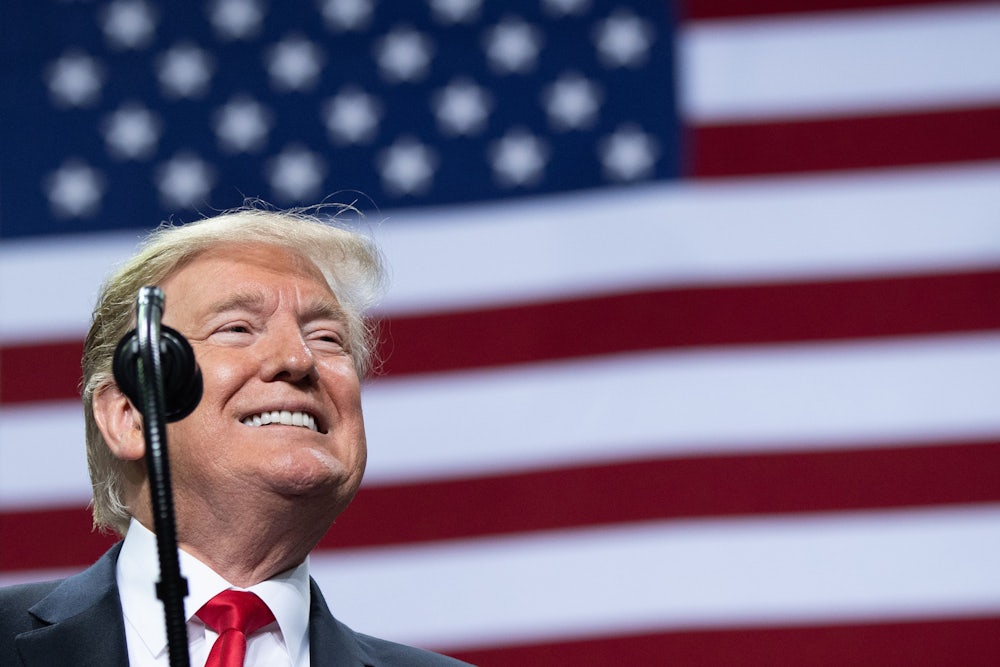Last week, President Donald Trump, in the midst of a Twitter meltdown that was grandiloquent even by his standards—50 tweets in 24 hours—made the case that the news media was missing the biggest story of his presidency. Not “collusion,” not obstruction, not his ceaseless tweeting or his seemingly improvised approach to both domestic and foreign policy, but the economy. “In the ‘old days’ if you were President and you had a good economy, you were basically immune from criticism,” Trump tweeted. “Remember, ‘It’s the economy stupid.’ Today I have, as President, perhaps the greatest economy in history...and to the Mainstream Media, it means NOTHING. But it will!”
This is, as Bill Clinton will readily testify, revisionist history. But it’s an argument that Trump has been making for the majority of his presidency: Don’t focus on the opinion polls, which reveal him to be a historically and consistently unpopular president. Instead, focus on GDP growth and the stock market, which for Trump have come to encompass an alternative approval poll.
“The economy really is the strong point for Donald Trump,” said former Representative Jason Chaffetz. Appearing on Fox News Sunday, the Utah Republican echoed Trump, telling Chris Wallace, “You can do the tweets and all this other noise that are out there, but when people feel good at home, they’re going to stick with the person who has the White House.”
This has been conventional wisdom for decades; the president’s tweet is roughly quoting Clinton campaign guru James Carville, after all. But the narrative might not be as sound as Trump and his surrogates think it is. A Washington Post-ABC poll released on Monday found that “60 percent of all voters say the country’s economic system mainly benefits those in power,” including “8 in 10 Democrats and more than 6 in 10 independents” and “nearly a third of Republicans.” This is good news for Democratic presidential candidates—if, that is, they’re prepared to craft a populist economic message.
Trump should recognize that he’s more vulnerable on the economy than the big-picture economic data suggests. In 2016, after all, the economy was pretty good—which, many argued at the time, benefited the incumbent party, the Democrats. Hillary Clinton based her campaign on continuing the economic recovery that had begun under President Obama. But Trump (and, for that matter, Bernie Sanders) made a different argument, that the recovery was only benefiting a small percentage of people, while millions were falling further behind. That latter take resonated.
This cycle, Democrats would be wise to make a similar argument about the economy under Trump: that the corruption of this administration, combined with the regressive impact of the GOP’s $1.5 trillion tax cut bill, have doubled down on a system built for the interests of a small group of extremely wealthy people—and that’s causing everyone else to lose ground. Democrats missed their chance at fixing that system in the wake of the 2008 financial crisis, but they can craft a message around it now—and further damage Trump’s reelection hopes. This argument, moreover, can also be attached to nearly every major domestic policy issue in the primary, from expanding access to health care to fairer taxation, from really rebuilding the nation’s infrastructure to aggressively prosecuting antitrust violations.
That said, nothing is automatic. Democrats might not be positioned to capitalize, the way Trump did, on the synergistic effects of economic anxiety coupled with cultural anxiety. Economic worries were actually decreasing across the population during the Obama administration, according to John Sides, Michael Tesler, and Lynn Vavreck, the authors of the book Identity Crisis. But when “economic anxiety was refracted through social identities ... the combination was potent.” Still, with a majority of independents and many Republicans in the Post poll notably dissatisfied with the way the economy has treated them, there is a counter argument for Democrats to make when the president again turns to what he called on election night the “forgotten men and women of our country” and tries to claim “promises made, promises kept.”
With this growing evidence that the topline strength of the economy may not be the boon for Trump’s reelection chances he thinks it is, crafting an electoral strategy around restoring good governance and economic fairness would be wise for Democrats. To an extent, many candidates—particularly Sanders and Elizabeth Warren—are already there (or almost there). Throughout this pre-primary season, most of the leading Democratic candidates have mirrored the strategy that helped their party retake the House in last November’s midterm elections. They’re not (despite the nonstop contrary contentions of cable news) actually talking much about Russia or impeachment or, for that matter, Trump. Instead, they’re focusing on issues and policies, most notably health care. And Democratic voters seem to be responding.
But the temptation to change course—to focus on the daily circus surrounding the president—is growing. Joe Biden, despite his hard-won self-branding as a champion of the working class, has entered the race with a message (reminiscent of the closing weeks of Clinton’s 2016 campaign) centered on Trump’s unfitness for office. Biden might be able to win the Democratic primary with that message, but he should be prepared to fight more than the last war. Given the very real pain still felt across broad swaths of the electorate, Democrats’ best general election strategy will be to focus on Trump’s policies, not just on Trump.
